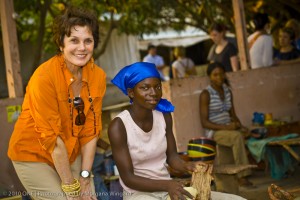
For me, each day in Ghana has gotten better. Yesterday I met my first African Chief, or Nana. He was resplendent in a blue and gold kinte cloth and he sported a five foot long gold pendant that would have convulsed any rapper—but then you notice the solid gold starfish rings. Nana donated the land for a rice cooperative that was mainly fueled by female labor. The men mostly stood around and watched as the women harvested the rice in ankle deep mud with machetes. The women also pulled out the threshing machine and carried the winnowed rice to the milling equipment. But what was great was that TechnoServe, a US NGO, had given this farm the tools to support themselves by teaching them how to increase yields and do the math that would allow them to pay back the loans they had borrowed to seed new crops. TechnoServe had not been back to this particular farm for the last eighteen months but the farmers had already saved in advance for their next bank payment. If you ask the women what they spend their increased income on, their first response is school fees for their children.
Soaring interest rates of up to 35% are a huge problem for small businesses in Ghana so saving is hard when profit margins can be completely eaten up by interest. We visited the business of Josephine who made small pieces of furniture and hand carved African masks. She told us that several years ago when she got an order for 200,000 units from Target, no bank would give her credit to purchase materials for a month. She was able to complete 70% of the order. But then she claimed the Chinese came along and ripped off her designs and the cheaper “made in China” models undercut her business.
The Chinese are everywhere in Africa. We met the First Lady of Ghana, Mrs. Ernestina Naadu Mills, a soft spoken retired educator who would like to establish a drug rehab center—in the last few years Ghana has become a transit point for drugs coming from Latin America on their way to Europe. She confided that the wife of the Chinese ambassador had given her $5000 for her proposed center. The Chinese are also building a new highway leading out of Accra to the north near the seaport—a contract that was part of the U.S. funded Millennium Challenge Corporation. So the Chinese are quietly and firmly putting their stamp everywhere.
Last night we had a dinner with leading Ghanaian women and it was a treat to meet this well-spoken, charming group who talked about the same things professional women in the U.S. talk about—how to break through the glass ceiling, how to mount a political campaign, how to network and connect with one another. They talked about the need to get support in the medium range—not a huge grant for major efforts to combat aids or malaria, but $20,000 to begin a business. This is a country where it is a struggle to convince families even to educate girls at all. Boys still go first. Attitudes are beginning to change, however. Yesterday afternoon we visited Nyanyano Primary School of more than 700 girls and boys and were treated to a dance and mimed play acted out by the students in which the father refused to educate his daughter and banished her. Years later when he had been injured by the wastrel son he supported, he had to go to the hospital, only to be treated by his daughter, who had become a doctor! Watching the children act out throw themselves into this lively scenario in front of the whole school in the hot sun on a dusty platform with a drum accompaniment was really something. The actress on our tour, Connie Britton, said it was one of the most exciting pieces of theater she had ever seen. Later, Cindy McCain nearly got mobbed as she presented two soccer balls as our gifts. To these children a soccer ball is the equivalent of giving one of our kids a sports car.
Today we visited a truly remarkable school for girls, Nsaba Diaspora Community Senior High School, a boarding and day school established for girls from a region outside Accra where 107 girls sleep under malaria nets in immaculate surroundings and supervised by a top notch governing board of female educators who have also established an FM radio station to propagandize about the importance of female education. It costs $600 a year to go there, forty percent of the girls are on scholarship. One woman stood up and told us she sold wares on the street for years to save up to come. She is in her third year of high school and is 29 years old. The school requires that the girls crop their hair because the administrators do not want them diverted from their studies by worrying about their looks. We also gave the girls soccer balls and they were as thrilled as the boys had been yesterday. They have no sports equipment at all. In Ghana, a donation as small as a soccer ball can make a tremendous difference. South Africa singer, Yvonne Chaka Chaka, told the girls that she had grown up in Soweto and that her dreams and education—not to mention her talent—had saved her. When she learned the 29 year old only had one pair of shoes, she gave her a pair of her own and there were tears all around. After three days here, we know we want to support and help not only these admirable women of Ghana but women and girls throughout Africa. Through ONE’s new initiative, Women ONE2ONE, we are going to figure out some ways that all of you can become involved too.

No Comments